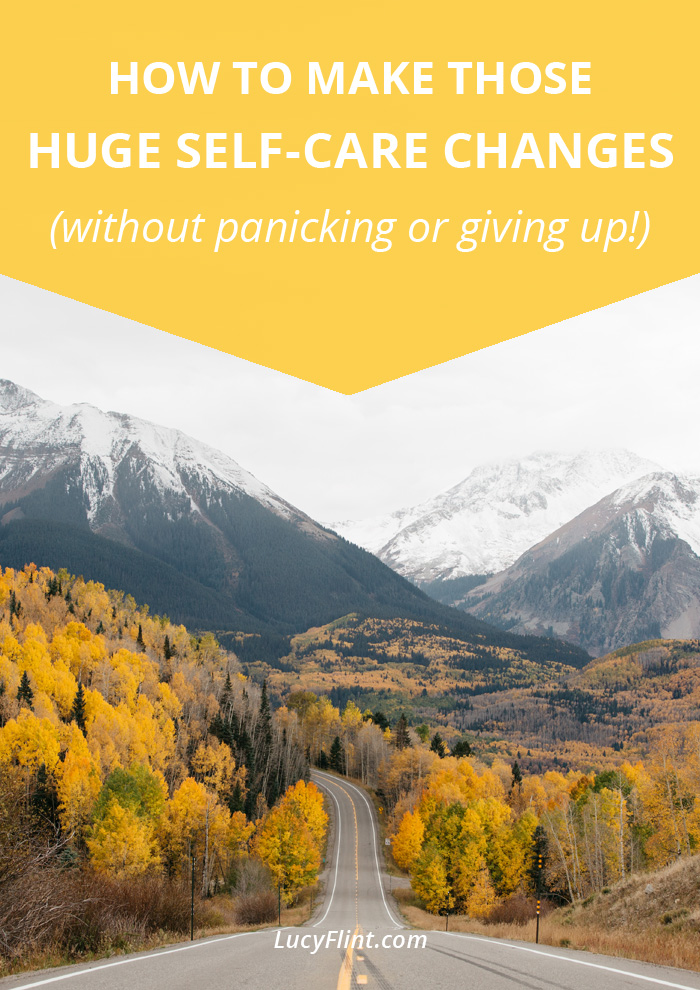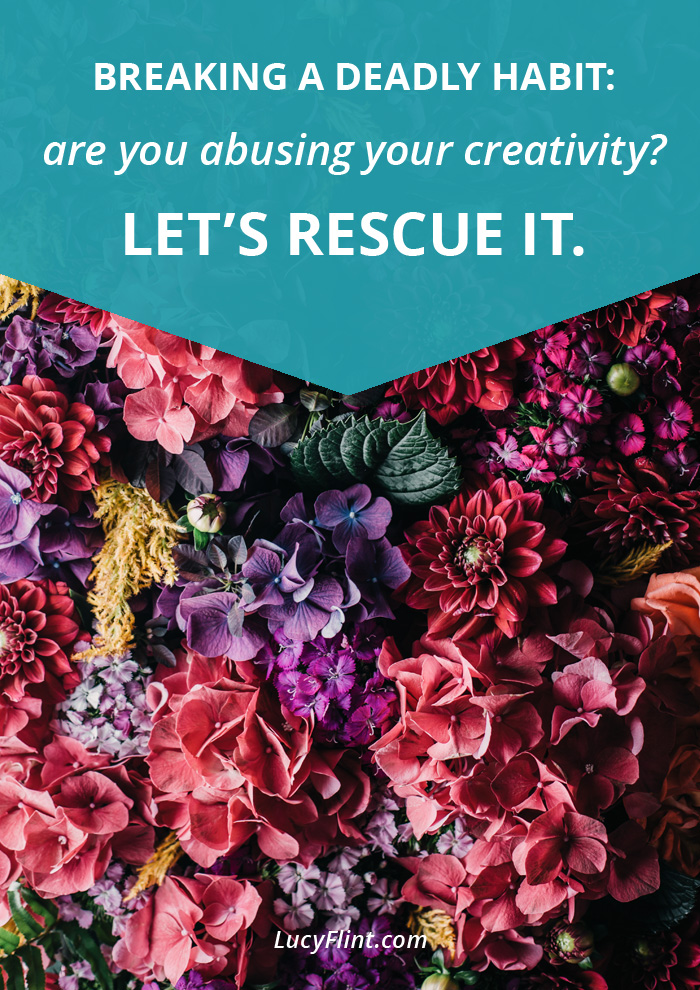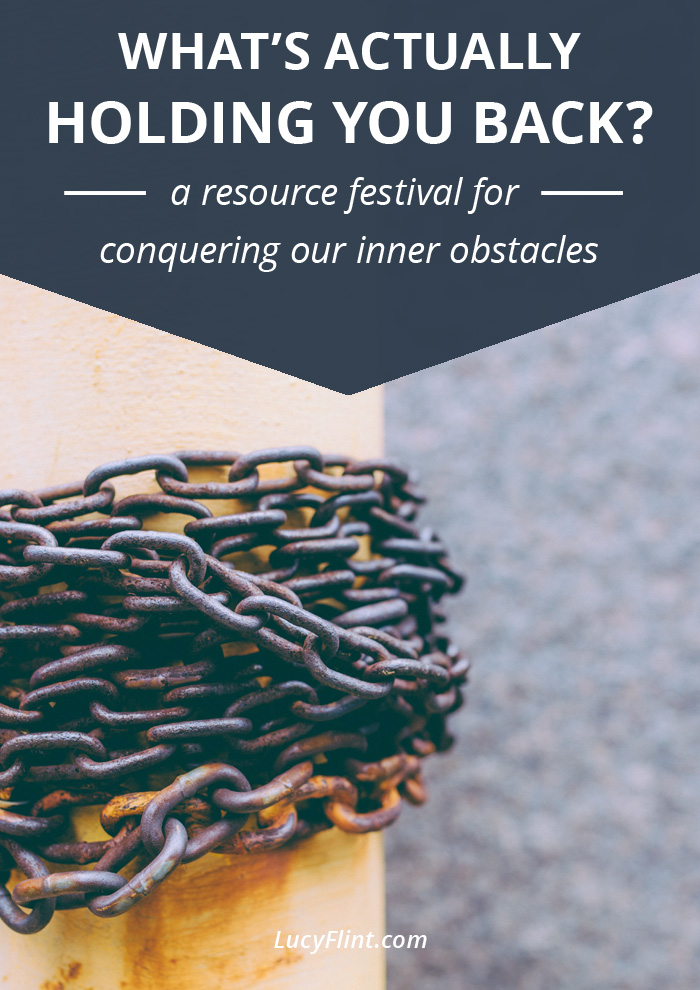How to Make Those Huge Self-Care Changes (Without Panicking or Giving Up!)
/Holy moly, my friends: We covered some major territory this August.
It was the month of self-care for writers, and we came at it from every angle! From looking at our ability to rest, to how we protect our creativity; from nurturing our artistic selves, to embracing enthusiasm over discipline.
I talked a LOT about my favorite new life-changing resources for overhauling my creative lifestyle and for becoming the kind of human I most want to be. We talked about pulling shame out by its roots, and we talked about the space-creating power of saying "no."
WHEW! Sometimes it felt like self-care, and sometimes maybe it felt a little more like sandpaper, but either way: I hope it did some deep, good things for you and your writing work.
Before we wrap up the series, though, I've realized that there are four things left to say. Each one is fairly small, but when you bring them together, all this self-care stuff kinda clicks into place.
Ready? This'll be fun. Here's where we start:
1. We can't underestimate the power of play.
One thing that came up over and over and over this month—from Brené Brown and Julia Cameron—was how vital it is to play.
It nourishes our imaginations, our work, our creativity, and our whole dang lives. So important! And yet, so dismissible.
I'm working on being intentional about playfulness, because I'm convinced of its benefits ... but it does not come easily for me.
And if that's you, too, then I wanna share something that's helped me so much. Here's what I've realized:
Play isn't a reward for a job well done.
It is its prerequisite.
As I've added more playfulness into my days, I've found more ease in my work.
And even though Julia Cameron told me that would happen, I still felt kinda shocked. I mean—I was just goofing off! Being silly! Pulling out an old hobby or three from when I was a kid, and suddenly, my heart feels lighter when I work?
Strange but true.
And when you realize that playing well is a prerequisite for doing great work, it becomes a priority.
Pro tip: If you are working on protecting your time and schedule so that you have the space to play and pursue hobbies, it can feel tricky.
Especially if you're new to this whole idea of play being important.
So here's what I've been doing: instead of calling it play, I call it prep.
So, if anyone asks you why you aren't free, and it's because you've blocked out that time to play and delight in creativity, do not say, "I can't do it because I'm going to be messing around with a kid's watercolor set all afternoon." *apologetic grin*
Don't say that unless you feel extremely confident. (In which case: good for you, go to it!)
Instead, say with all earnestness, "I need the afternoon to do some essential preparations for my work week."
People are much more likely to nod seriously back to you. (At least, that's been true for me, so far!) And then you go and pull out your paint set and have a blast!
And actually, that statement is the fullest version of the truth. A truth that we need to keep saying out loud, to ourselves, to others: Play is our best prep.
2. And also, we've gotta resist the temptation to skip the chiropractics.
After guzzling as much information and wisdom as we've covered in this series, it's easy to feel a little bloated. A bit dazed.
The question I faced over and over this summer was: How can I possibly put all of this into action, all at once?
You know the feeling, right? When you're reading a book and every chapter presents about eighty things that you'd like to instantly adopt in your life?
Whew! It's dizzying.
My temptation is usually to follow this little process:
Take a zillion impassioned notes
Tell everyone how amazing it is and how my life has definitely changed
Reread the notes and become fatally overwhelmed
Collapse
Forget the book
Come across a new life-changing book, and begin the process again...
It's a very exhilarating process, but not quite as helpful as it could be, haha! ;)
Let's be honest: It can get uncomfortable when our minds or our hearts have outdistanced our actions.
You know? When you have all this amazing information, or when you feel so strongly that something is right... but then you come up against your patterns, behaviors, habits, environment.
And it can feel so dang hard to change course, that it's easier to just let go of all the new stuff and slip into old ways.
The trouble with that? Is no matter how hard we try to numb our new awareness, no matter how we try to quiet the new information, we've still been changed.
And if we live in the old way, we can get this weird feeling of disconnection. Feeling a little out-of-place in our lives.
We're forcing ourselves to ignore the new truth we've discovered, and that just doesn't sit so well.
So how do we bring integrity into our lives? That lovely alignment of what we believe, what we know, what we feel, and how we behave?
I'm fairly new to the world of chiropractors and the amazing transformations they can achieve. But the two chiropractors I've met with have worked little step by little step.
Moving my spine back into alignment, one subtle adjustment at a time. Or healing my body from a tangle of troubles, one little behavior at a time.
Meaning?
You don't have to go after all of this, all at once. Integrity can happen a little at a time. The key is just that you start.
Maybe you start with the single biggest behavior. You find the largest game changer, the most enormous truth, and you just work on digesting that into your life.
The rest can wait.
Or, maybe you start from the other end. You find the one thing that seems easiest, that feels the most within reach. Pick the tiniest, most doable change. And commit to just doing that.
The rest can wait.
So maybe you start with the big, and begin by tackling shame resilience or perfectionism.
Or maybe you start with the small sustainable thing, and write three pages every morning or give yourself permission to have a ten-minute nap every afternoon.
Whatever you pick, be super proud of yourself. You're bringing your habits into integrity, and that's a beautiful process.
As I've worked on this bit by little bit this summer, I've felt my self-respect totally shift. Because when we're working toward integrity, respect is a natural byproduct.
It's amazing how big an internal difference even those small choices can make. Everything starts to feel better when we take steps to line up what we know with what we do!
And that brings us to...
3. Let's make practice our new favorite word.
Seriously. I have fallen in love with the concept of practice.
I used to only see it as (I admit it) a form of drudgery. What can I say, more than a decade of music practice on two instruments... I didn't always love it! :)
But Brené Brown caught my attention early on in The Gift of Imperfection as she talked about practicing courage.
Practicing compassion.
Huh, I thought. What an unusual way to describe it. She referred to a gratitude practice, a vulnerability practice.
That's a new way to frame that kind of behavior, right?
But the power of the word practice didn't fully hit me until, actually, I was doing a yoga video. (Yoga with Adriene—if you want a recommendation—is very accessible, hilarious, and oh-so lovely.)
And in the midst of working on a pose, she said, We don't get on our yoga mats to DO yoga. We PRACTICE yoga. Let yourself practice.
... At which point I fell out of the pose and just stared, because that's it. It all hit home.
It's too easy to view everything through a pass/fail lens. Did I do well, did I do my best, did I pass? Every time we show up with writing, creativity, self-awareness, playfulness, courage, or any other behavior we're trying to improve.
That pressure of "I have to do my best, every time!" can be really draining, really restricting. And frankly, it's death to all these beautiful creative behaviors we've been working on this month.
Let's skip the pass/fail idea. Life is not a series of final drafts: it's a long and glorious field for practicing.
So we practice our courage, and we practice our compassion.
We practice saying "no" when we need to, and we practice getting more rest.
Through the practicing process, we can explore. "Does this work better, or could I try it this other way?" We can stay curious. We can experiment. We're more free.
So I'm going to embrace the beauty and flexibility of practice. And when I remember that I'm just practicing, my willingness to try quadruples. Even when the thing I'm trying out (courage! shame resilience! the next draft of the novel!) is daunting and difficult.
Heck, I'm just practicing! We'll see how it goes.
So, as you think about whatever struck you most in this month of exploring self-care, I'd commend to you that concept of practice. Keep reminding yourself, you don't have to get it right the first, or third, or eleventh time.
What a relief, right? Let's show up for practice.
4. What next? Here's my tool of choice for moving forward...
You know me: I took the idea of creative preparation, and my deep desire for integrity, as well as my willingness to practice deeply and persistently.
And guess what that all added up to, for me?
A list. Yes. Because I love lists with a love that will not die.
This is a very, very unusual list, though.
It's a list full of baby steps, in all the directions that I want to go.
And I promise, it's a total antithesis to my old, arthritic, perfectionist-driven lists. Unlike so many lists I've made, this one doesn't feel like shackles.
Nope. This feels more like training wheels, like kindhearted coaching. Like the best sort of game. Like a series of exciting invitations.
I made it because I didn't want to forget anything. And then I expanded it because I wanted to keep coming back to these new, beautiful reminders.
... And because I realized that if I stopped and worked on metabolizing each new realization as it first hit me, then it would take me a decade to finish these books. They were that rich and full of insight.
I wanted to keep practicing the new behaviors, and to check back in with each one, and check back again. And all the while, the list grew and grew.
So now, it's a series of sweet baby steps, one after another leading me further along this new way of being.
This is how I'm practicing. This is how I'm working toward alignment, toward integrity. I'm encouraged and guided by the loveliest, most inviting list I've ever made in my life.
It's full of incredibly kind reminders to think about authenticity, courage, self-compassion, creativity, and playfulness.
It holds invitations for bigger artist dates, splashier treats for my imagination, and ways to coax and cajole me out of my many ruts.
And as I've been working through the items on it, I've felt myself changing. I'm feeling a bit more free, more brave, more authentic. It's incredibly exciting, and I can't wait to see where it leads!
So how about you, my brave lionhearted friends? You've stuck around through a pretty wild month: this definitely hasn't sounded like a typical "writing" blog lately!
Where are you at, after everything we've talked about? What feels exciting for you? What are you working on?
Given everything we've covered this month—what's the kindest practice you could start? Or where do you feel the most out of line with your integrity?
Do you feel like you want to start something big? Or, equally brave, begin something small?
September is such a lovely time for beginning new behaviors. Who do you want to be, for the rest of the year?















